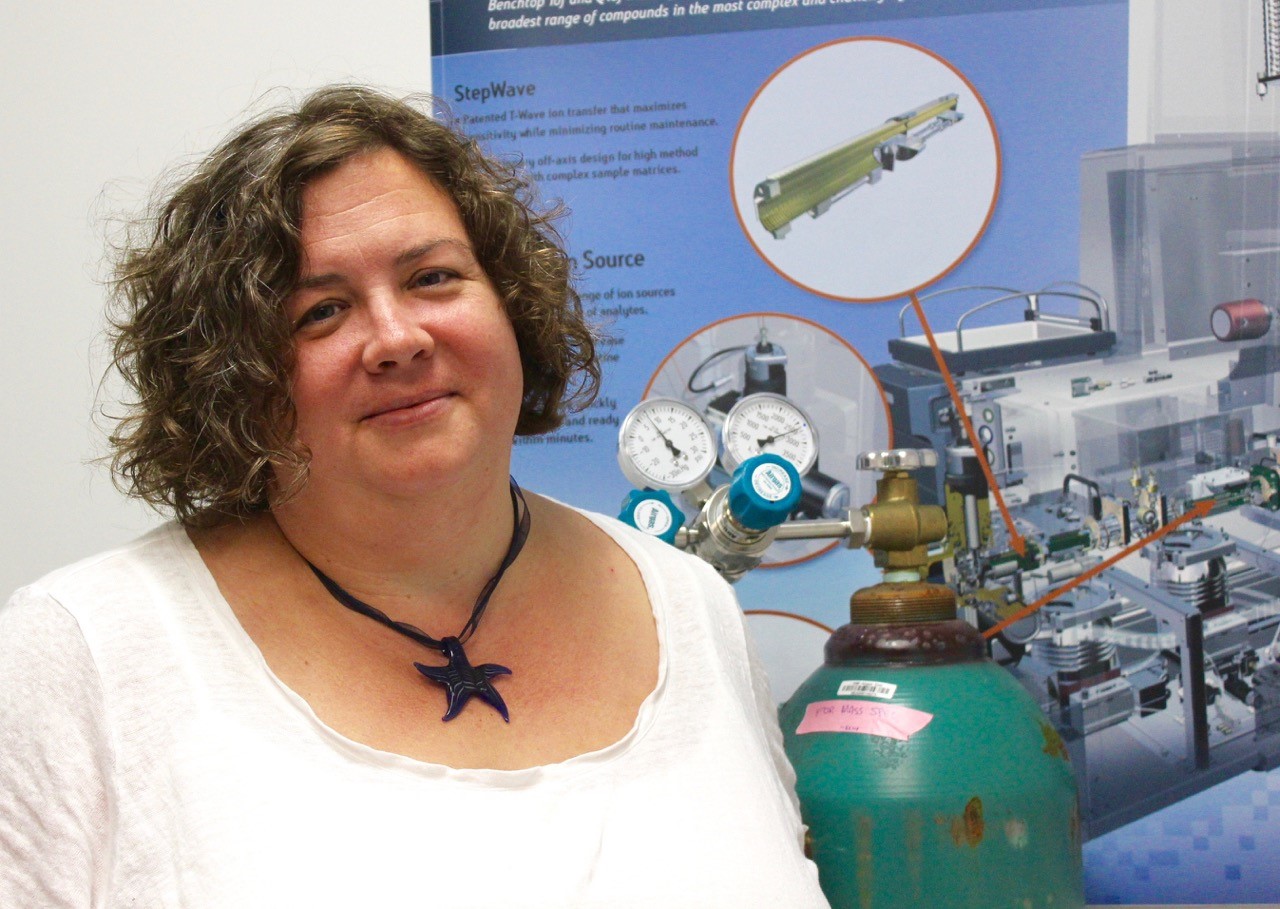Fogarty grants are awarded as part of the International Research Scientists Development Award (IRSDA) program to help support young scientists as they are beginning their careers. In 2009, Marcy Balunas received one. She put it to good use.

In fact, her story was recently featured in the Global Health Matters newsletter of the National Institutes of Health (NIH). The article discussed the success of IRSDA in promoting the careers of the more than 75 young investigators who have received Fogarty grants since the program began in 1999. Balunas, a medicinal and natural products chemist, was cited for her work involving the study of host microbe interactions in marine organisms in an effort to isolate compounds that can be transformed into treatments for cancer and other illnesses.
Balunas describes her work with marine organisms, particularly with tunicates – or sea squirts – as an outgrowth of her early interest in studying plant natural products and the role they might play in the treatment of cancer. Both her grandmother and mother had been victims of this disease, so her interest was personal.
“I completed my Ph.D. at the University of Illinois at Chicago and was looking for a post-doc where I could continue my work on natural products. I came across the International Cooperative Biodiversity Group (ICBG) and the work that Bill Gerwick was doing and I applied for a position in his lab,” she says.
Gerwick, a distinguished professor at the Scripps Institution of Oceanography – University of California at San Diego – was, himself, a Fogarty International Senior Fellow. His internationally recognized research attracts the ‘best and the brightest’ among those studying marine organisms, including the intricate relationship between these organisms and the cyanobacteria – bacteria that obtain energy through photosynthesis – that inhabit them.
Balunas says that the switch from plant natural products to marine natural products was not as dramatic as it seems, and it was immediately apparent that she had made the right choice to apply for that post doc. Her work involved spending three years in Panama on an appointment funded by the NIH, Smithsonian Tropical Research Institute, the Panama National Biomedical Labs, and Scripps.
Living and Learning in Panama
While living in this compact Central American country that lies between the Caribbean Sea and the Pacific Ocean, she studied marine cyanobacteria for use against three tropical diseases – malaria, Chagas’ disease, and leishmaniasis – as well as cancer. At the time, as the only resident chemist at the research institute, she also further developed her knowledge of synthetic chemistry and chemical instrumentation, including nuclear magnetic resonance and mass spectrometry – skills, she says, that have helped her immeasurably in her subsequent career.
From a purely academic standpoint, Balunas was thriving in the rich environment provided by the ICBG – a cohort filled with talented researchers like herself. But, perhaps more by accident than by design, she discovered another interest that influenced her both as a post-doc and, subsequently, as professor of Medicinal Chemistry in the Department of Pharmaceutical Sciences at the UConn School of Pharmacy.
It turns out that she has a talent for mentoring and it’s a skill she has been happy to hone ever since.
“When I arrived in Panama, I had just finished my Ph.D. and one of my students was an American who was in her first year as a graduate student. We were only about four years apart in terms of our training, and I had to learn to be more of a mentor than a friend, while keeping a good relationship,” Balunas says. “I’m afraid there was a learning curve for both of us!”
While studying Spanish in her newly adopted country, she also worked with local Panamanian scientists, teaching them about natural products drug discovery. This, too, required her to develop her mentoring skills while using a language she was only just learning and working with students from another culture. Rather than being discouraged by the experience, she found it immensely rewarding.
Working with Students
“I first really learned about the importance of mentoring – across language, culture, and age – when I was on that post-doc,” she says, “and now it is the favorite part of my job.”
In her lab at UConn, Balunas works with post-docs, Ph.D. and Pharm. D. students, and undergraduates. “There are people from all over, both culturally and academically. It is really cool to see a student’s eyes light up – when they “get it” – when all of a sudden a student is getting good data and we can start writing papers together,” she says with enthusiasm.
While talking about mentoring, it is perhaps inevitable that attracting women to the STEM fields becomes a topic of conversation. Balunas participates in WiMSE, UConn’s faculty group devoted to women in math, science, and engineering, and she is realistic about the challenges facing women in academia who want to start families, particularly those on career paths leading to tenure.
“I was just awarded tenure,” she says, “and UConn is supportive of gender balance and of giving faculty additional time on their tenure clocks for parental leave. But, it is still challenging to balance work and family life. I tell my students who are considering careers in academia that they will have to plan carefully and set priorities if having children is something they want to do. There’s no reason women can’t succeed in science [or other STEM fields] but it’s still an uphill battle and they need to be prepared for it.”
In may not be surprising that when Balunas gave birth to her daughter a few years ago, she named her Eleanor. As in Roosevelt. A human rights pioneer who once said, ‘You must do the things you think you cannot do’ and a suitable role model for a little girl her mom calls Ellie.



